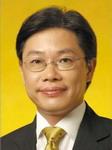|
Macau and the election that wasˇK On September 25 Macau citizens took to the polls for a second time since the handover to elect a legislative assembly. Even with typhoon "Damrey" threatening to ruin the elections, Macau experienced its highest voter turnout in history with 129,000 (about 58 per cent of registered voters) casting their ballots. |
|
Mok, a first time participant as a candidate, was satisfied with the election results for his own group, praising his campaign group and supporters for all their efforts in what was their first time running for the Legislative Assembly elections. He also showed great satisfaction with the levels of participation in the election showing that "many citizens (...) are in support of democratic process", a process which he feels is important not only in this time of tremendous change but is always important as "elections in a way reflect the opinions of the Macau citizens and what they are striving for and expecting from the governing bodies."
His group feels that the most pressing issue to Macau citizens is the stable growth of Macau's society, with emphasis on achieving social stability by means of a stable economic situation and by sharing and investing resources fairly. Theirs is not a position of complacency on the current economic situation which is heavily dependent on the gambling and tourism industries, but one of innovation set to use the current economic situation to develop and diversify the economic capabilities of the territory by means of comprehensive social programs set to revitalize the city and empower its citizens.
Mok makes it very clear that investments in education and science & technology are some of the most important factors for the development of a skilled labor force in Macau stating that "only through the enhancement on the education of the local population could guarantee a continuous supply of quality people to the work force which eventually propels Macau toward a city with multifarious businesses rather than solely relying on gaming and tourism industry." Diversification, he says, is the "key (...) to create a sustainable balance growth in a stable and harmonious society with the aim of enhancing the quality of life for the Macau population".
When asked about issues such as Macau's end to a gaming monopoly, the construction of the new Macau-Hong Kong-Zuhai bridge and the ever increasing flow of tourists into the territory (which is putting pressure on an already limited infrastructure), Mok replies with a very heads on, positive perspective. He looks at the end of the gaming monopoly as a definitive positive step and the short-term economic boom as proof of it, although he and his group do believe that greater cooperation between all of the gambling operators, also a major point of their campaign, can lead to an improved and healthier competitive environment.
As for issues such as the new trans-regional bridge and the increasing
tourist flow, he views them not only as inevitabilities, but also opportunities
for which Macau citizens have to prepare themselves for so as to make
the most of the impending economic situation that these changes will
bring to the territory.
